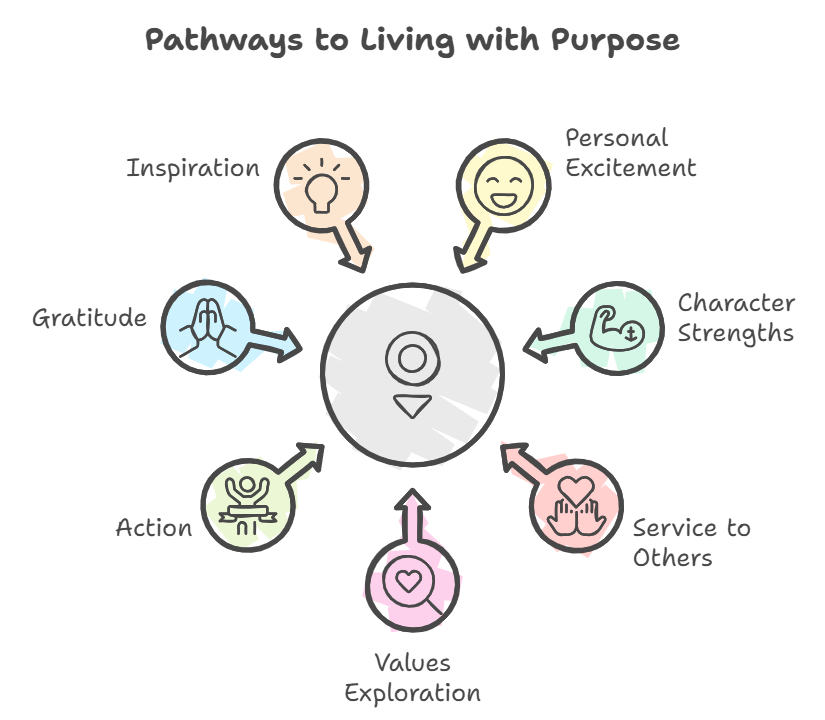Living with purpose. It’s a phrase we hear often. Many people search for a purposeful life. But what does it truly mean, and how do we achieve it?
This isn’t about finding some grand, singular mission. It’s about weaving intention into the everyday. Make choices that align with your values and cultivate a sense of meaning in all we do.
What Does Living with Purpose Mean?
Living with purpose means aligning your actions and choices with your core values. This alignment creates a sense of meaning and fulfillment.
It’s not about achieving some lofty goal, but how you show up each day. This involves understanding what truly matters to you.
Think about what brings you joy. What issues ignite your passion? What kind of impact do you want to make?
Purpose can be found in family, career, personal growth, and giving back. It’s a journey of continuous reflection and growth.
Your definition of purpose may shift over time, and that’s okay. Embrace the evolution of your meaningful life.
Purpose is a journey of continuous reflection and growth. Your definition of purpose may shift over time, and that’s okay. Embrace the evolution of your meaningful life.
It’s not about achieving some lofty goal, but how you show up each day. This involves understanding what truly matters to you.
Think about what brings you joy. What issues ignite your passion? What kind of impact do you want to make? Purpose can be found in family, career, personal growth, and giving back. It’s a journey of continuous reflection and growth.
Your definition of purpose may shift over time, and that’s okay. Embrace the evolution of your meaningful life.
Why is Living with Purpose Important?
There’s real power in living purposefully. Studies show a strong correlation between purpose and well-being1.
People with a sense of purpose report greater happiness, resilience, and even better physical health. They experience positive emotions and a greater sense of their character strengths.
A 2019 study reveals only 20% of US adults report having found their purpose. This emphasizes the need to explore this further.
Further research links purposeful living with a reduced risk of cardiovascular disease. It also shows strengthened immune function.
“Life is never made unbearable by circumstances, but only by lack of meaning and purpose.”
Viktor Frankl
Living with purpose is more than a feel-good concept. It has a positive impact on overall wellness and longevity.
How Do I Start Living with Purpose?
Start by asking what truly makes you excited. This isn’t about fleeting entertainment, but deep, intrinsic contentment and excitement.

Reflect on reoccurring themes or skills people notice in you. Consider taking the VIA Character Strengths Survey for added insights.
Another point is service – contributing your gifts. Think about what comes naturally.
If you constantly volunteer for certain tasks, see that as a hint. It may be showing you your unique inclination for giving.
This research2 shows helping others creates a positive feedback loop. This increases happiness, well-being, and connection. Consider these actions to align with your purpose. Start living purposefully today.
Explore Your Values
Values are your compass. They are your North Star. Many valuable insights come from the Greater Good’s Purpose Challenge3.
Start by reflecting on what’s most important. Is it compassion, community, or helping others? Consider journaling your thoughts. Reflect on how different areas of life connect to your values.
As Professor Kendall Bronk suggests, clarifying these values may be the first step. It is a great first step towards uncovering where they can make a real impact. A life lived on purpose can be fulfilling.
Take Action
Living with purpose goes beyond just reflecting. It’s action-oriented. Begin to experiment with different activities and groups.
Consider how certain actions may resonate or contradict your values. This allows you to refine your vision of purpose. Find purpose by volunteering for giving opportunities4.
This helps you understand how contributing benefits both you and others. Research backs up the positive impact volunteering has. Stop making excuses and begin taking small actions.
Focus on where you think your passions lay. Watch the pieces slowly fall into place over time. Embrace every small win toward finding purpose.
Embrace Gratitude
Cultivating gratitude is vital when living with purpose. By appreciating even small moments, you start noticing life’s blessings.
This enriches your outlook and drives action towards goals. Gratitude helps shift our perspective, highlighting opportunities amidst difficulty. It is a core element of a purpose-filled life, which is discussed further in our article on self-actualization.
Additionally, gratitude increases emotional intelligence and creates deeper fulfillment, helping you build a meaningful life.
Research at the Greater Good Science Center5 emphasizes how practices like gratitude journaling enhance overall purpose. The John Templeton Foundation supported this research. Writing gratitude letters also helps with this. They increase positive emotions, which improve behavioral and mental health.
Seek Inspiration
Surround yourself with people who inspire you. Find mentors or role models who demonstrate lives lived with intent.
Look to their paths and extract insights. Learning from others’ journeys can often guide you. Even simple purposeful conversations with others can offer direction.
Sharing meaningful stories has strengthened many people’s understanding of living with purpose. Discussing different values with close family has revealed surprising insights for many. Doing so pushes your sense of self and connection. This aligns with Bronk’s suggestion regarding these type of conversations.
These conversations create a clear direction for helping both yourself and those you value most. Engaging with stories of acts of human kindness can trigger a sense of responsibility. It can push you towards contributing to something bigger.
Seek real-life role models you already know. Be open to new connections through groups aligned with your values. These steps can help you to continue living with purpose.
Frequently Asked Questions
What does it mean to live with purpose?
Living with purpose is about understanding your core values. It’s about making choices aligned with them. Living with purpose means finding meaning in what you do.
This applies not only to career goals but to all life areas. It affects your relationships and contributions to society. It even impacts how you interact with others and contribute to causes.
Living with purpose fosters fulfillment and provides motivation. It gives you a stronger connection with something larger than yourself. It involves ongoing self-reflection as we adapt through various phases. This ongoing refinement over time makes it impactful.
How to start living with purpose?
Begin reflecting on what truly excites or dissatisfies you. Look at all aspects of your daily life and relationships. Identifying things others appreciate about you is helpful.
Start with gratitude by taking stock of your unique abilities or gifts. Identify what gives the most internal satisfaction or contentment.
Align those thoughts, words, and actions into the decisions you make. Don’t let the pursuit of a perfect plan prevent you from just trying. Begin and keep showing up with the goal of finding purpose.
Take any kind of consistent, positive action and stick to it long term. Don’t be scared by how big it seems. Avoid just giving into others’ views while neglecting your inner calling.
Why can’t I find purpose in life?
You’re not alone in feeling like your purpose eludes you. Our journey with finding purpose often unfolds by asking key questions. It is not merely about what tasks occupy most of our time.
It’s also important to think about older adults.
Instead, we must ask what gives our time the most meaning or impact (to others as well as ourselves). Focus not solely on daily achievements or external wins.
Concentrate inward, where the impact often happens so quietly unnoticed. Start with yourself, internally and intrinsically. Those in high school can especially struggle to feel their purpose.
Give that inward-looking work action consistently day by day. That’s when meaning is slowly infused into even simple acts. Ultimately, this creates purpose from those accumulated quiet victories. It takes work and focus.
Associate Professor Patrick Hill’s research focuses on how subtle changes create powerful purpose in even everyday routines. He emphasizes that it’s often hidden in plain sight.
A supported living environment can offer people with developmental disabilities more purpose. Many adults lose their purpose as they become older adults, though many do live a purposeful life and this helps mental and physical ability decline slower than some.
Why is it important to live a purpose-filled life?
Research shows strong correlations between purpose and several benefits. It impacts well-being on all levels (health, longevity, and even economic success).
A sense of purpose gives you motivation to overcome challenges. It enhances mental well-being by increasing joy, satisfaction, and gratitude (research supports practicing gratitude). It enhances life on all levels, mind and body. A purposeful life is truly meaningful.
Conclusion
Living with purpose isn’t some lofty ideal. It’s the thread that connects the ordinary days into an impactful story of your life.
Keep clarifying what brings meaning. Focus on everything from big passions to daily actions. Reflect on your values and make choices that align with them.
Consider how and why your choices impact others. It’s your continued refinement over time that weaves true lasting meaning into seemingly small efforts. These add up over time. Challenge those self-imposed limitations.
Avoid comparison, seek mentors, and avoid negativity. Let your purpose gain internal traction and outward impact through quiet and powerful change. Committing to self-improvement and service to others leads to true personal power. This creates deep personal and outward impact through seemingly simple yet impactful action and thought. This is how you live with purpose.
Small Step, Big Impact
Living with purpose starts with small, intentional steps. Reflect daily on actions aligned with your values, gradually fostering a more meaningful life.
Listen to this article
This is an AI generated Podcast version of the article.
- https://ourworldindata.org/happiness-and-life-satisfaction[↩]
- http://greatergood.berkeley.edu/article/item/5_ways_giving_is_good_for_you[↩]
- https://www.purposechallenge.org/?_ga=2.263867212.1521241116.1584901901-1211433880.1574091463[↩]
- https://vailhealthfoundation.org[↩]
- https://ggsc.berkeley.edu/what_we_do/major_initiatives/purpose_across_the_lifespan[↩]



